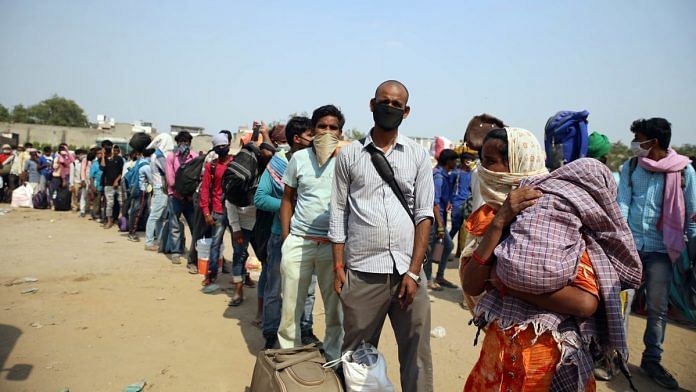The second wave of the coronavirus pandemic has forced many out of jobs and contributed to the already dim rate of unemployment in India. The worst affected are workers of the unorganised sector who have already begun to face wage loss due to the curfews and lockdowns in states like Delhi and Maharashtra. The night curfews and lockdowns have impacted sex workers, auto-rickshaw drivers, small stalls and construction workers dependent on the commotion of the night. More than the disease, the inability to earn two meals a day for themselves and their family is killing them. If night curfews and selected lockdowns have crippled the unorganised sector to this extent, imagine their fate if a national lockdown, which is being debated, comes into force.
Market forces can be cruel, especially when economic activity comes to a near standstill. Babasaheb Ambedkar was the pioneer of labour rights and social security. His research highlighted the hypocrisies of bureaucratic functionaries in maintaining exploitative relations with market. He was the first law minister of independent India to demand labour legislation. A labour bureaucracy susceptible to corruption has contributed to the maintenance of a structural inequality that accounts for the utmost exploitation of workers in society. Ambedkar also demanded social security measures for women and marginalised workers. While addressing the Constituent Assembly (25 November 1949), Ambedkar stated: “The consciousness of social security comes to a man when he feels that he is getting his basic rights”. Today, this sense of basic rights is under direct attack. The working class — dalits, migrants and labourers — is struggling to get access to healthcare facilities, and those who did are now getting crushed under high medical expenses, especially in rural pockets.
The healthcare system has failed to cater the underprivileged due to paucity of testing services, weak surveillance system and mismanagement. In the lists monitoring mortality and recovery, the underprivileged have turned into mere numbers.
Also read: ‘Where are our netas?’ Anger in UP over missing politicians as state buckles under Covid
The crumbling unorganised sector
According to the Azim Premji University Covid-19 Livelihoods Survey, there was a 34 per cent fall in earnings in April-May 2020 for self-employed non-agricultural workers in rural areas compared to February 2020. The fall was 43 per cent in urban areas. The decline in income percentage for casual workers during the lockdown is even more alarming with rural households seeing a massive 92 per cent average fall in earnings and urban spaces 86 per cent.
The necessity to protect the workers is of prime importance because the labour fraternity forms the backbone of the capitalist economy. A vast number of dalit youth are employed in the unorganised sector and their lives are crushed due to the adverse effect of the pandemic. There is growing psychological distress in these households, visible in the increasing number of reported cases of domestic violence.
Ambedkar had tirelessly worked for enhancing the capability of the working class and securing their rights with constitutional guarantees. As a member of the Viceroy’s Executive council (1942-1946), he undertook pivotal steps towards protecting the interest of the labour and labour welfare legislations. He stressed on skills upgrade and mechanisation, social security through legislation, establishment of employment exchanges, re-settlement of services personnel and war veterans. The Indian Trade Union (Amendment) Act, the Factories Act, The Payment of Wages Act, The Protection of Minimum Wages Act are some of the legislation initiated by Ambedkar towards securing workers’ rights. He also got enacted the Employees State Insurance Act 1948 to help workers with medical care, medical leave, and compensation for injuries at work. As a representative of the Depressed Classes in the Round Table Conference, he pleaded for living wages, decent working conditions and end to exploitative dominance of landlords over the peasants. Ambedkar was instrumental in the introduction of an eight-hour working day law.
Also read: Tens of millions have plunged into poverty as Covid ravages India
Most vulnerable: those burning the pyres
The rising death toll has amplified the load on crematoriums. This has led to organisations running these graveyards to employ extra workers to cut woods, manage funeral pyres and perform other works. The generation of caretakers employed in these graveyards are facing competition from a new labour influx. The crematorium staff and workers are the most vulnerable to Covid-19 and deserve protective gear as well as State protection on priority. It is important that they are declared frontline workers and vaccinated on priority.
There is a continual baggage of historical exclusion that the working class has faced. And the financial crunch during the pandemic has made them more vulnerable. They need Personal Protection Equipment (PPEs), minimum wages, food, insurance, accommodation, mechanisation of the work, and transportation, like other health workers. The caste system restricts sanitation work to the dalits and hence their apathy continues. The Dom community, which is historically assigned the task of burning dead bodies, are the worst affected.
The workers — dalits, migrants and labourers — are finding it particularly difficult to get access to resources. The medical facilities available to them are poor as government hospitals are already facing constraints maintaining the system. Black-marketing and behind-the-door policies have further ruined their chances of getting access to the system. There have been reports capturing inhuman working conditions at crematoriums and graveyards. They are working in some places for 12-15 hours without any extra wage. This also has an impact on their mental health. There is a need to recognise their work and provide them basic social security that they deserve.
Aditi Narayani is assistant professor at Maitreyi College and founder of Dalit Aadivasi Professor and Scholar’s Association. Views are personal.
(Edited by Anurag Chaubey)



